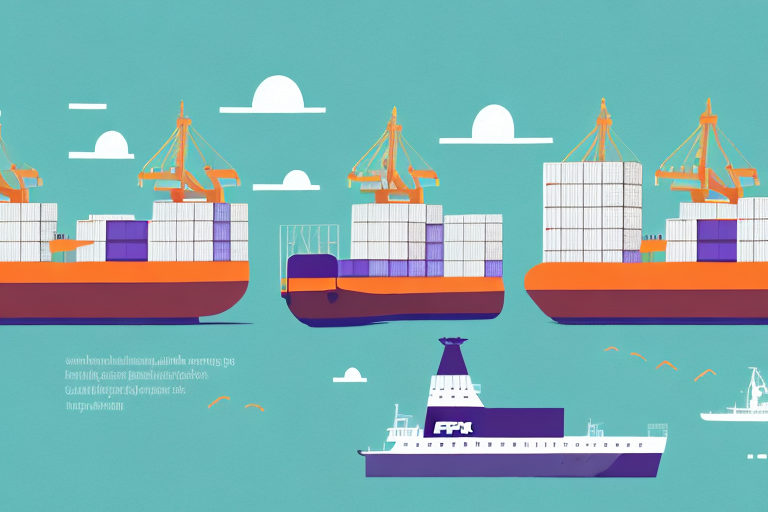When it comes to choosing a shipping carrier for your business, cost plays a significant role. FedEx and UPS are two of the biggest players in the shipping industry, and both offer competitive rates for bulk shipping. In this article, we will compare the bulk shipping rates of FedEx and UPS, and help you decide which carrier is right for your business.
Understanding the Differences between FedEx and UPS
Before we dive into the rates, let's take a quick look at the differences between FedEx and UPS. FedEx is known for its fast delivery times and excellent customer service. They also offer a range of shipping options, including ground, air, and international. UPS, on the other hand, is known for its reliable service and extensive delivery network. They offer similar shipping options as FedEx, and are known for their expertise in international shipping.
Another key difference between FedEx and UPS is their approach to package tracking. FedEx offers real-time tracking updates, allowing customers to see exactly where their package is at any given time. UPS, on the other hand, offers a more detailed tracking system that includes information on package location, delivery time estimates, and even the name of the person who signed for the package. This level of detail can be especially helpful for businesses that need to keep track of multiple shipments at once.
The Importance of Bulk Shipping Rates for Businesses
Bulk shipping rates are crucial for businesses that rely on shipping to deliver their products. The cost of shipping can significantly impact the overall profitability of a business. This is why it's essential to choose a carrier that offers competitive rates for bulk shipping.
Moreover, bulk shipping rates can also affect the pricing of products. If a business is unable to secure affordable bulk shipping rates, they may have to increase the price of their products to cover the high shipping costs. This can make their products less competitive in the market, leading to a decrease in sales and revenue.
How to Choose the Right Shipping Carrier for Your Business Needs
Choosing the right shipping carrier for your business depends on a variety of factors, including the volume of shipments, the type of products you're shipping, and your budget. Before making a decision, it's important to thoroughly research each carrier and compare their rates, services, and reputation. You should also consider factors such as delivery times, package tracking, and customer service.
Another important factor to consider when choosing a shipping carrier is their coverage area. Some carriers may have limited coverage in certain regions or countries, which could impact your ability to reach customers in those areas. It's important to choose a carrier that can meet your shipping needs both domestically and internationally, if necessary.
In addition, it's important to consider the environmental impact of your shipping choices. Some carriers may have more sustainable practices than others, such as using electric or hybrid vehicles, or offering carbon offset programs. By choosing a carrier with more sustainable practices, you can reduce your business's carbon footprint and appeal to environmentally-conscious customers.
A Comprehensive Comparison of FedEx and UPS Bulk Shipping Rates
Let's take a closer look at the bulk shipping rates offered by FedEx and UPS. It's important to note that rates can vary depending on the weight and size of the package, as well as the distance it will be shipped. These rates are based on packages weighing between 5 and 50 pounds, shipped within the contiguous United States.
Ground Shipping Rates
For ground shipping, FedEx offers rates starting at $8.98 for a 5-pound package and $25.41 for a 50-pound package. UPS offers slightly lower rates, starting at $8.23 for a 5-pound package and $24.86 for a 50-pound package.
Air Freight Shipping Rates
For air freight shipping, FedEx offers rates starting at $95.59 for a 5-pound package and $403.26 for a 50-pound package. UPS offers similar rates, starting at $90.52 for a 5-pound package and $402.53 for a 50-pound package.
International Shipping Rates
For international shipping, FedEx and UPS both offer competitive rates. However, the rates can vary significantly depending on the destination country, the weight and size of the package, and the delivery time. It's important to research the rates for each carrier based on your specific shipping needs.
It's also worth noting that both FedEx and UPS offer additional services that can affect the overall cost of shipping. These services include insurance, signature confirmation, and delivery options such as Saturday delivery or delivery to a specific location. It's important to consider these options when comparing rates and choosing a carrier for your bulk shipping needs.
Understanding the Factors that Affect Bulk Shipping Rates
Several factors can affect bulk shipping rates, including the type of package, the distance it will be shipped, and the delivery method. Some carriers may also charge additional fees for special services, such as residential delivery or weekend delivery. It's important to fully understand these factors when comparing rates between carriers.
Another factor that can affect bulk shipping rates is the weight of the package. Heavier packages may incur higher shipping costs due to the additional fuel and handling required to transport them. Additionally, the size and dimensions of the package can also impact the shipping rate, as carriers may charge more for oversized or irregularly shaped packages.
Another consideration when it comes to bulk shipping rates is the mode of transportation. Shipping by air may be faster, but it can also be more expensive than shipping by sea or ground. However, shipping by sea or ground may take longer and may not be suitable for time-sensitive shipments. It's important to weigh the pros and cons of each transportation mode when determining the most cost-effective shipping method for your needs.
Tips for Negotiating Better Bulk Shipping Rates with FedEx and UPS
If you're a high-volume shipper, you may be able to negotiate better rates with FedEx and UPS. Some carriers offer volume discounts for businesses that ship a certain number of packages per month. You can also try negotiating with a carrier to see if they're willing to lower their rates to win your business.
Another way to potentially lower your shipping costs is to consider alternative shipping methods, such as using regional carriers or consolidators. These options may offer lower rates for certain shipping routes or package sizes. It's important to do your research and compare rates from different carriers to find the best option for your business.
Evaluating Other Factors besides Cost When Choosing a Shipping Carrier
While cost is an essential factor when choosing a shipping carrier, it's not the only one. Other factors, such as delivery times, package tracking, and customer service, can also impact your decision. It's important to take all of these factors into consideration when choosing a carrier.
One important factor to consider when choosing a shipping carrier is the type of products you are shipping. Some carriers may specialize in certain types of products, such as fragile or oversized items, and may have better handling and delivery options for those items. It's important to choose a carrier that can handle your specific products with care and efficiency.
Another factor to consider is the carrier's coverage area. Some carriers may have limited coverage in certain regions or countries, which can impact your ability to ship to certain locations. It's important to choose a carrier that has a wide coverage area and can meet your shipping needs, both domestically and internationally.
How to Maximize Savings on Bulk Shipping with FedEx and UPS
There are several ways to maximize your savings on bulk shipping with FedEx and UPS. One option is to use a shipping software that can help you compare rates and choose the most cost-effective option. You can also try consolidating your packages into a single shipment to take advantage of volume discounts.
In conclusion, both FedEx and UPS offer competitive bulk shipping rates, and choosing the right carrier depends on your specific shipping needs. By thoroughly researching and comparing the rates and services of each carrier, you can make an informed decision and maximize your savings on bulk shipping.
Another way to save on bulk shipping is to negotiate rates with the carriers. If you have a high volume of shipments, you may be able to negotiate lower rates with FedEx or UPS. It's also important to regularly review your shipping invoices to ensure that you are being charged correctly and to identify any areas where you can further reduce costs.









